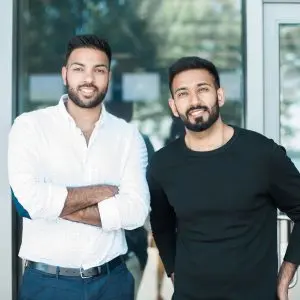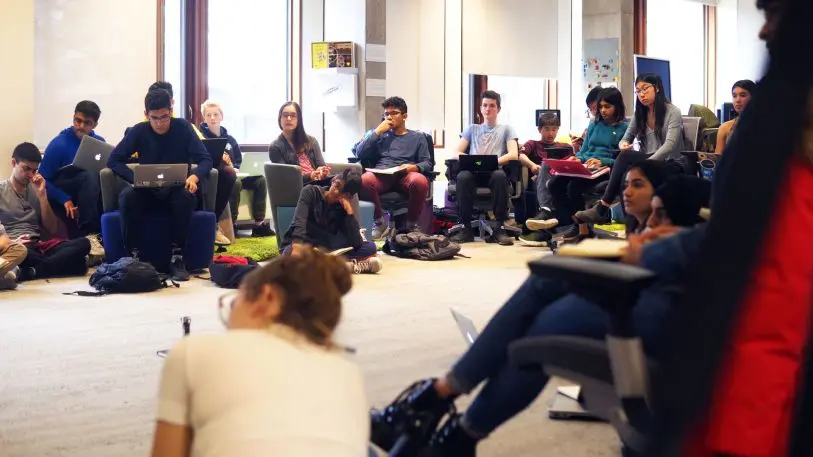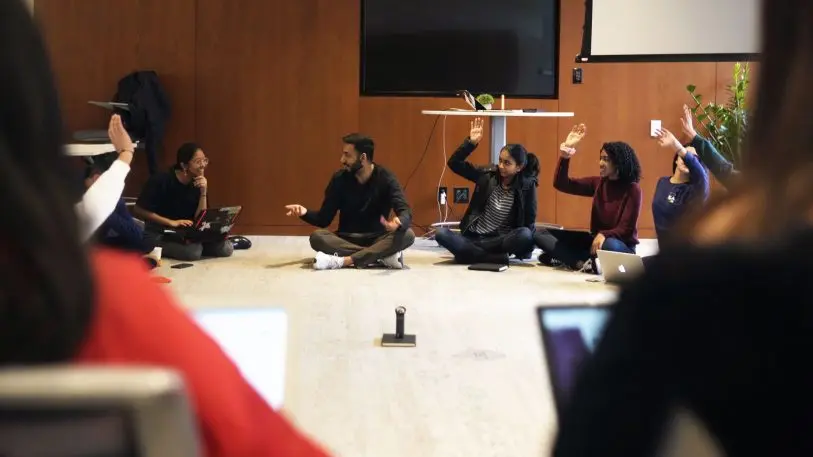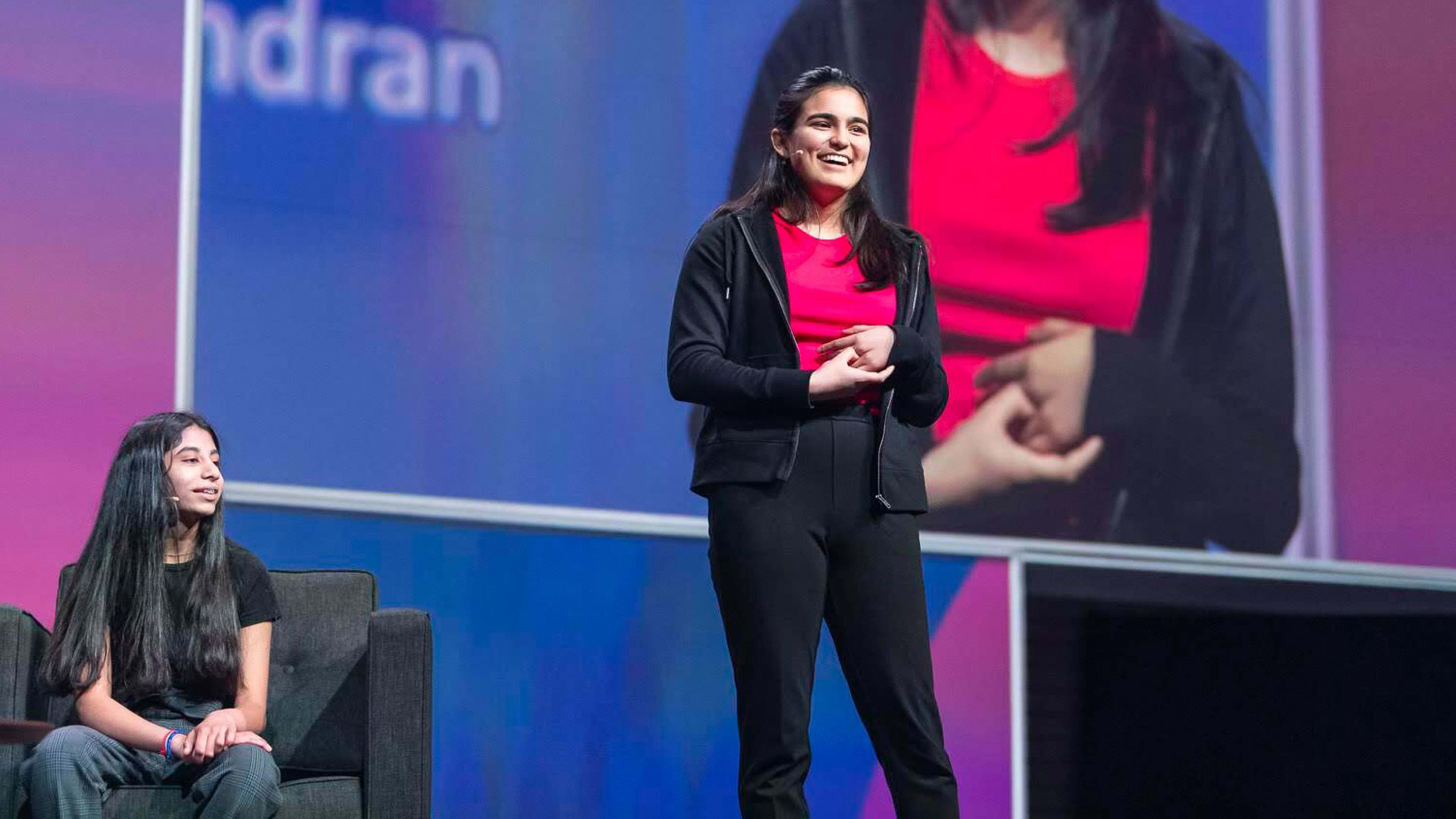In 2016, Ananya Chadha was just a regular 14-year-old girl struggling to fit in at her high school in Toronto. She often had sci-fi-inspired fantasies about building futuristic technologies like jet-pack shoes, going so far as to look into where she could buy parts.
Then one day two brothers, Navid and Nadeem Nathoo, came to her school and described a new type of educational program they started called The Knowledge Society, or TKS. “They talked about essentially creating the next Elon Musk,” recalls Chadha, now 18 years old. “When they talked about taking crazy ideas and unconventional paths and making it real, I was like ‘Wow, I need this.'”
It would sound like a rip-off of a classic superhero story if it weren’t completely true: ordinary teenagers being recruited into an elite program designed to give them the power to do extraordinary things, and maybe even save the world. While many programs like the Flatiron School focus on teaching entrepreneurship or tech skills to high school students, TKS, which was founded in 2016, is unique for giving students both the hard skills they need to build next-generation solutions to some of the world’s biggest problems as well as the soft skills they need to communicate and create them.

After the app, G-gnome, was acquired by a blockchain startup, she switched her focus to computer-human interfaces. In 2018 Chadha secured a sponsorship from Microsoft to build a remote control car that she can control by meditating. Today she interns for IBM.
“What I found unique was their ability to connect advances in bleeding-edge technologies to tackle hard problems our society faces on daily basis,” says Piotr Mierzejewski, the director of Db2 deployment for IBM Data and AI. “These young minds don’t seem to be discouraged by how hard and complex problems they are trying to solve are; they simply face the challenge to find solutions.”
In recent months Chadha has presented her work at some of the biggest technology conferences in the world, she was named to the 2019 class of Canada’s Developer 30-Under-30, and she won First Prize in engineering.com’s Impossible Science Challenge.
Chadha, however, is just one of almost 400 students who have achieved incredible feats after enrolling in TKS.
Building the next Elon Musk
After the Nathoos spent three years developing the program in Toronto and Waterloo, TKS is expanding to New York, Boston, Las Vegas, and Ottawa in the fall— enrolling 80 students in each new chapter—and offering a new program in Toronto for students as young as nine.

Nathoo cofounded the cloud management startup Airpost, which was acquired by Box in 2015. His brother Nadeem previously worked as a consultant for McKinsey & Company. Together they set out to build the program they wish they’d had access to when they were young, while training the next generation to develop technologies that will help solve some of the world’s most pressing problems in healthcare, finance, the environment, and more.
Underachievers welcome
Nathoo, however, emphasizes that students are not considered based on what they have accomplished previously, nor on their academic standing or previous experience.
“It’s very focussed on merit,” he says. “We don’t look at your grades, we don’t look at what clubs you’re in, we also don’t look at your background, we don’t look at your race, we don’t look at your gender, we don’t care what part of the city you live in.”
Through a written application and an interview process primarily consisting of open-ended questions, TKS seeks to identify those who have a sense of curiosity, an appetite for uncertainty, and a hunger for pursuing bold ideas. While the program costs $6,250 per year, Nathoo says that they try to accommodate every student who is admitted by offering financial aid and flexible payment options. In fact, there are 163 students currently enrolled in Toronto and Waterloo and hundreds more who have been through the program.
Ordinary teens doing extraordinary things
Though the program is only in its third year, its students have already made a significant impact.
One 18-year-old student, Hannah Le, was able to double the lifespan of fruit flies through gene editing; 17-year-old Liam Hinzman is working on a machine-learning project that detects rare diseases in medical images; 17-year-old Cameron Kerr cofounded a company that’s using machine learning to improve vaccines in preparation for the next global epidemic; 16-year-old Shagun Maheshwari is using AI and genome data to improve cancer detection; 15-year-old Isabella Grandic is working with the world’s leading lab-grown meat specialist in Amsterdam this summer; and 14-year-old Areez Bhanji is interning at Microsoft after building a decentralized application using blockchain. The list goes on.

“I start looking at these applications, and they’re all from Toronto,” says Robin Raskin, the founder of Living in Digital Times, which runs the Young Innovators to Watch scholarship program at CES. “I see they all have TKS in common, so that’s when I called Navid, who runs TKS, and he’s like the real deal; he’s a guy with a vision, he and his brother.”
Balancing hard and soft skills
Though she was skeptical at first—concerned that the program was “a rich kids’ club” or too focused on theory and incapable of providing real-world application—Raskin says the Nathoo brothers quickly won her over.
“I was super impressed with how they’re training these kids to think about their lives,” she says. “A lot of other programs, many encourage entrepreneurship, many encourage coding. [TKS] has a good balance between the technical skills and the other skills that surround it.”
While the program seeks to teach students about emerging technologies, it’s not all quantum computing and gene editing and blockchain; the three-year educational program also puts a strong emphasis on interpersonal skills, communication, psychology, philosophy, business development, and any other skill the Nathoo brothers believe will help students succeed in a quickly changing world. Indeed, LinkedIn’s 2019 Global Talent Trends report showed that 92% of talent professionals and hiring managers say that soft skills are just as important as—or more important than—hard skills.
Beyond the new program for 9- to 12-year-olds, which is called “foundations,” TKS offers three individual one-year programs for those aged 13 to 17. “The first program is called ‘innovate,’ which focuses on emerging technologies,” says Nathoo. “The second program is called ‘activate,’ which actually focuses on real-world industries—like understanding agriculture, pharma, legal, finance, real estate, transportation. Then the third program is ‘disrupt,’ which is where you learn how to execute on ideas, building real-world actionable skills on solving these problems.”

“When I first met some of their graduates from their Toronto program, I was immediately taken with how passionate, curious, and thoughtful they were for such a young age,” says Tony Hsieh, the CEO of Zappos. “It’s not often that we get to help offer an opportunity like this to our community, so when we had the chance to be a part of their local operation, it was important for us to get involved from day one.”
The program invites local thought leaders to share their expertise and inspire optimism in their students. “Especially in the first session, they really focus on the positive side of things, how we can impact millions and millions of people in a positive way,” says 19-year-old Ben Nashman, who enrolled in the program in 2016. “You’re not going to attempt next-generation things without being somewhat optimistic about it, and that’s their mentality.”
In 2017 Nashman founded Synex Medical, a startup that’s partnering with the Sinai Health System to develop a wearable, non-invasive blood-testing device. The ring they developed can detect glucose, ketones, cholesterol, metabolic rate, lactate, and even alcohol levels in the wearer’s bloodstream, all without needles or finger pricks.
A stark contrast to traditional education
While not all of TKS’s students find traditional schooling too easy for their level of intelligence, many express a level of boredom toward it, often feeling like social outsiders. “They don’t care about the Kardashians; they want to talk about black holes,” says Nathoo.
He adds that TKS isn’t intended to replace traditional education, and he still encourages students to complete their studies. Students spend three hours per week in TKS classes, and typically dedicate another 10 to 15 to self-directed learning and creation, on top of their typical school responsibilities.
“It’s not for everybody,” explains Nashman, “but it’s also for more people than most would assume.”
Whether intentionally or not, however, the contrast between the program and traditional schooling underscores how the system is failing students, especially those with extraordinary potential.
Raskin, for one, believes breaking coursework down into specific categories like math and English fails to offer context and connections between subjects. “Things like TKS make you be more cross-disciplinary, and that is the future,” she says.

Raskin also applauds the program for giving students a sense of belonging. She explains that many talented young people struggle with social insecurities; often they just need to be encouraged and to be surrounded by others like them in order to succeed.
“I go to conferences, I speak to journalists, I work at amazing places alongside amazing people—which is amazing—then I go to school and nobody wants to speak to me,” says Chadha. “In grade nine I was bullied like it was really bad—without TKS, I don’t know what I would have done. I’m super grateful for it.”
Recognize your brand’s excellence by applying to this year’s Brands That Matter Awards before the early-rate deadline, May 3.
